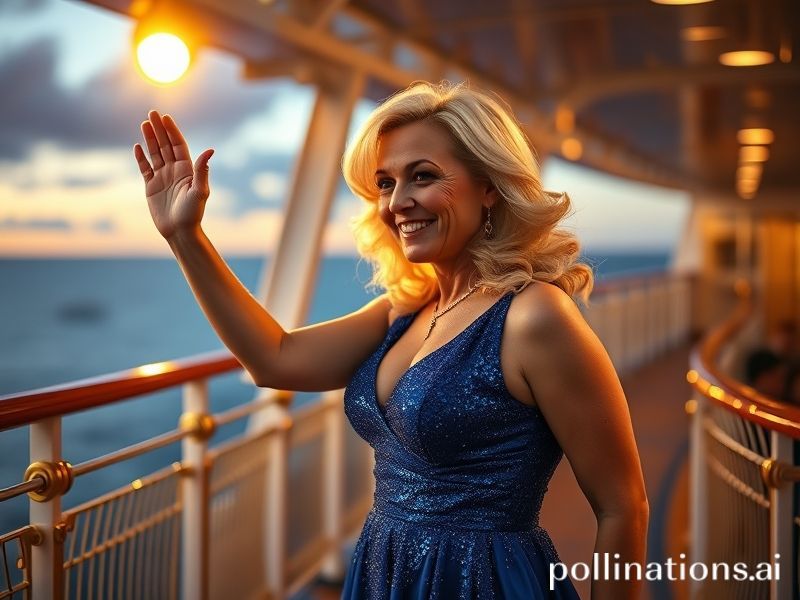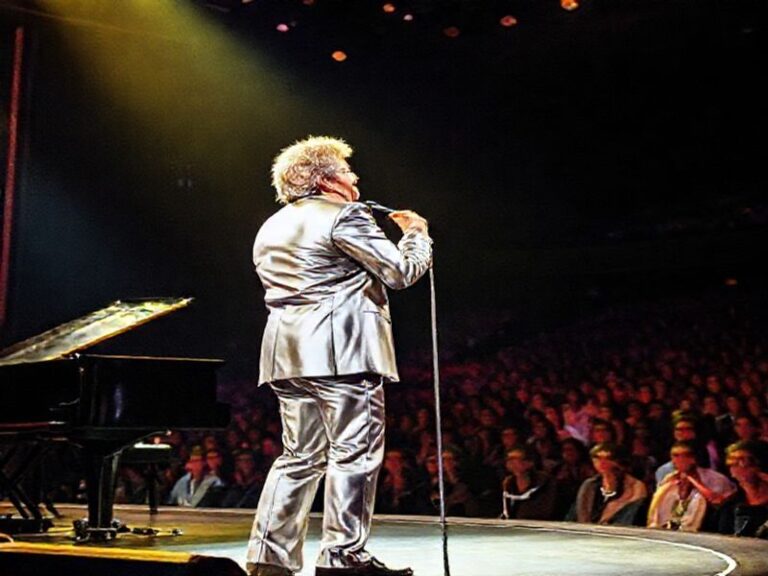Jane McDonald: How a Cruise-Ship Diva Quietly Conquered the Seven Seas and Maybe the World
Jane McDonald and the Curious Soft Power of a Cruise-Ship Chanteuse
Dave’s Locker – International Desk, somewhere between the buffet and the lifeboats
If you mention “Jane McDonald” in a Manchester pub, someone will involuntarily hum “Cruise,” raise an imaginary piña colada, and reminisce about 1998—the year Britain briefly convinced itself that nautical karaoke could heal a post-Diana, pre-Brexit wound. Say the same name in a bar in Montevideo and you’ll be met with the polite blank stare reserved for Yorkshire pudding recipes and reliable British trains. Yet the two reactions are not as far apart as they appear. Ms. McDonald, once a red-jacketed cruise-ship entertainment officer warbling to retirees on the MS Horizon, has become a minor but strangely durable plank in the UK’s cultural export platform—proof that late-capitalist nations no longer export only arms and debt, but also middle-aged women belting power ballads at sea.
The global cruise industry—valued at roughly eight billion Jane McDonald souvenir tea towels—has long understood that the secret to separating pensioners from their pensions is a three-step strategy: 1) promise unlimited shrimp, 2) schedule port stops shorter than the average attention span, and 3) provide a nightly performer who looks like someone’s favorite auntie and sings like Celine Dion after a generous Merlot. Jane perfected the role so thoroughly that Channel 5 built an entire franchise around her: “Cruising with Jane McDonald,” now syndicated from Fiji to Finland, where subtitles valiantly translate terms like “proper chuffed” and “chips ‘n’ gravy” into seventeen languages, none of which quite capture the melancholy of a Bolton accent contemplating the Norwegian fjords.
International relations scholars (yes, there are at least three) have begun citing the show as a textbook example of “soft-power leakage.” When a British pensioner in Phuket waves a Union Jack sarong while singing along to Jane’s cover of “Time After Time,” it’s no longer mere tourism; it’s a post-imperial aftershock. Other nations have tried to replicate the formula—Germany’s answer, “Kreuzfahrt mit Kerstin,” was quietly scuttled after audiences realized Kerstin’s repertoire consisted entirely of Kraftwerk deep cuts—but none have achieved the same sticky nostalgia. This is perhaps because Britain alone possesses the precise ratio of drizzle-induced sentimentality and maritime nostalgia required to make a middle-aged woman on a floating shopping mall feel like Churchill at Yalta.
Meanwhile, the geopolitical implications ripple outward. The Panama Canal Authority reports a measurable spike in bookings whenever Jane airs an episode transiting the locks—engineers call it the McDonald Bump. In Croatia, Dubrovnik’s mayor publicly begged producers to stop featuring the city, claiming the subsequent influx of British cruisers wielding selfie sticks had turned the medieval walls into what locals grimly dub “the seventh kingdom of Westeros.” Even the European Commission once cited “the McDonald Effect” in a white paper on coastal over-tourism, though the paragraph was mysteriously redacted after a closed-door meeting with Carnival Corporation lobbyists who arrived humming “Let It Go” in four-part harmony.
Jane herself remains cheerfully bemused by the soft-power chatter. In a recent interview on Australian breakfast television—where she simultaneously promoted both a new album and a line of nautical-themed gin—she laughed off comparisons to the British Council, insisting she’s “just a lass from Wakefield who can hold a high C while the ship lists starboard.” The dark joke, of course, is that holding a high C while the world lists starboard is precisely what soft power looks like these days: less James Bond, more spa-deck soprano soothing the passengers as the iceberg looms politely in the middle distance.
And so we sail on. Climate reports warn that rising seas may one day swallow Venice’s Piazza San Marco, but they fail to mention that Jane’s camera crew has already booked the final gondola. Populists come and go, trade wars flare like onboard karaoke feuds, yet somewhere in international waters a 59-year-old woman in sequinned slacks belts out “I Will Survive” to a ballroom of tipsy septuagenarians who, for one glittering evening, believe her. If that isn’t a metaphor for the twenty-first-century order, I don’t know what is. Pass the sunscreen and try the shrimp—there may not be many voyages left.







